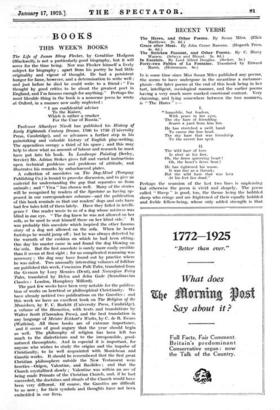BOOKS
THIS WEEK'S BOOKS
The Life of James Elroy Flecker, by Geraldine Hodgson (Blackwell), is not a particularly good biography, but it will serve for the time being. Nor was Flecker himself a lively subject for biography ; apart from his poetry he had little .originality and vigour of thought. He had a persistent hunger for fame,-however, and a determination to write well ; and just before he died he could write to a friend : " I'm thought by good critics to be about the greatest poet in England, and I'm famous enough for anything." Perhaps the most likeable thing in the book is a nonsense poem he wrote at Oxford, in a manner now sadly neglected : " I am confidential adviser
To the Kaiser, Which is rather a crusher For the Czar of Russia."
Professor Allardyce Nicoll has published his History of Early Eighteenth Century Drama, 1700 to 1750 (University Press, Cambridge), and so advances a further step in his painstaking and valuable history of English play-writing. The appendices occupy a third of his space ; and this may help to show what an amount of labour and research he must have put into his book. In Landscape Painting (Seeley, Service) Mr. Adrian Stokes gives full and varied instructions upon technical problems and problems of attitude, and illustrates his remarks by unhackneyed plates.
A collection of anecdotes on The Dog-Mind (Torquay Publishing Co.) is bound to provoke discussion, and to give us material for understanding the gap that separates us from animals ; and " Viva " has chosen well. Many of the stories will be recognized by readers of the Spectator as having ap- peared in our correspondence columns—and the publication of this book reminds us that our readers' dogs and cats have had few tales told of them lately. Have they failed in intelli- gence ? One reader wrote to us of a dog whose mistress was blind in one eye. " The dog knew he was not allowed on her sofa, so he used to seat himself there on her blind side." It was probably this anecdote which inspired the other famous story of a dog not allowed on the sofa. When he heard footsteps he would jump off ; but he was always detected by the warmth of the cushion on which he had been sitting. One day his master came in and found the dog blowing on the' sofa. But the first anecdote is surely more easily credible than it seems at first sight ; for no complicated reasoning was necessary ; the dog may have found out by practice where he was safest. Two unusually interesting volumes of folklore are published this week, Caucasian Folk Tales, translated from the German by Lucy Menzies (Dent), and Norwegian Fairy Tales, translated by Helen and John Gade (Scandinavian Classics : London, Humphrey Milford).
The past few weeks have been very notable for the publica- tion of works on heretical or philosophical Christianity. We have already noticed two publications on the Gnostics ; and this week we have an excellent book on The Religion of the Manichees, by F. C. Burkitt (University Press, Cambridge), a volume of the Herrnitiea, with texts and translations by Walter Scott (Clarendon Press), and the best translation in any language of Meister Eahart's Works, by C. de B. Evans (Watkins). All these books are of extreme importance, and it seems of good augury that the year should begin so well. The philosophy of religion has been left too much to the dialecticians and to the irresponsible, good- natured theosophists. And in especial it is important, for anyone who wishes to study the origins and the impulse of Christianity, to be well acquainted with Manichean and Gnostic works. It should be remembered that the first great Christian philosophers outside . the New Testament were hereties—Origen, Valentine, and Basilides ; and that the Church crystallized slowly ; Valentine, was within an ace of ,being made Primate of the Christian Church, and, if he had succeeded, the doctrines and rituals of the Church would have been very different.' Of course, the Gnostics are difficult io us now ; for their symbols and thoughts have not been embedded in our lives.










































 Previous page
Previous page